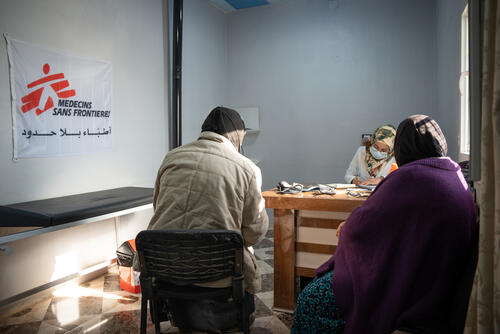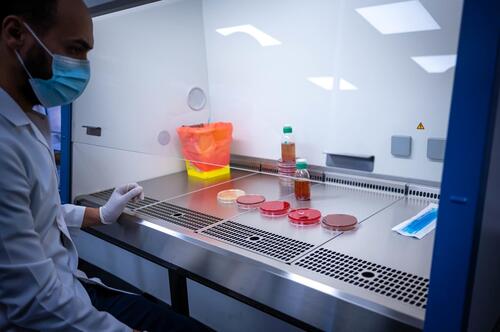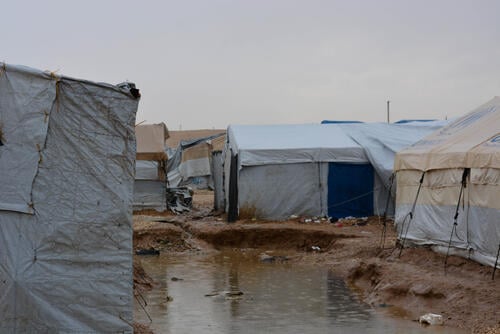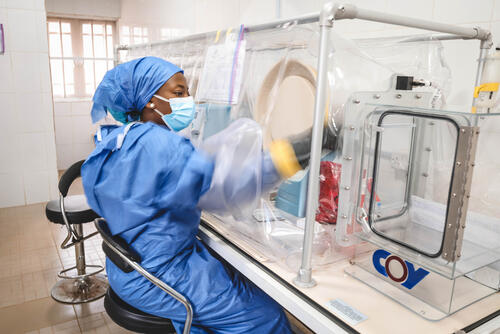- Medical needs in northern Syria far exceed the available medical services amidst further funding cuts in the region.
- People in northern Syria continue to struggle from the destruction of the February 2023 earthquake and more than 13 years of brutal war.
- Médecins Sans Frontières (MSF) calls upon the donor community attending the Brussels conference to prioritise the financial support of the Syrian health sector.
Amman/Brussels – International financial support to the health system in northern Syria is in decline. The medical needs in the region far exceed the available medical services, with Syrian people bearing the greatest burden due to limited support and the closure of hospitals and health facilities.
Yet, this dire situation is being treated with further funding cuts. MSF calls upon the donor community attending the Brussels conference to prioritise the financial support of the Syrian health sector.
After years of conflict, millions of people in northern Syria are facing even greater challenges to accessing healthcare, with the decline of international financial support for the Syrian health system, says MSF.
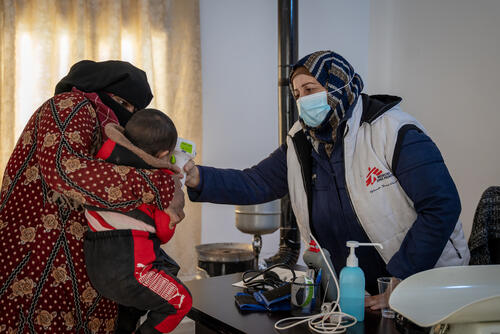
Nearly a third of health facilities in Idlib and northern Aleppo governorates have either closed or partially suspended activities due to underfunding, leaving 1.5 million people without access to lifesaving and emergency healthcare, with 112 health facilities at risk of closing by the end of June according to local authorities. MSF urges international donors and governments to immediately boost their financial support for the health system in northern Syria.
Ahead of international donors and donor states meeting in Brussels on 27 May, the situation in Syria is dire. In 2024, US$4.07 billion is the total funding required to respond to humanitarian needs in Syria. However, just six per cent, or $326 million, has been funded through the Humanitarian Response Plan (HRP).
International donors and donor states must allocate sufficient funds for healthcare, as the situation is becoming more difficult for people, with fewer functioning health facilities, overcrowding of the ones that are functioning, shortages of medications, and a lack of staff.
“Syrian people are bearing the greatest burden of the financial shortfall because hospitals are not being funded,” says Carlos Arias, MSF medical coordinator for northwest Syria. “Because of that, when people seek healthcare, they find hospitals either closed, or there’s no doctors or no medications. If they find a doctor, they’re asked to go buy medicine from private pharmacies, which is unaffordable.”
I am 68 years old and a diabetic; hospital closures will be a death sentence to people like me.Salim Mohammed, internally displaced in northwest Syria.
The funding shortfall and the impact on the healthcare system could lead to the deterioration of long-term health conditions, increased outbreaks of diseases, and compromised quality of life for people. Groups such as children and pregnant women could be particularly affected, for example, if there is a lack of vaccination campaigns. This comes as the region is already reeling following the destruction inflicted by the February 2023 earthquake and conflict which has endured for more than 13 years.
People are facing growing water scarcity, leading them to be more dependent on water trucking and water networks. However, these are hampered by unstable power supplies and high fuel costs. As a result, the lack of water forces people to adopt negative coping mechanisms such as reducing water consumption or using unsafe drinking water.
MSF covers a limited proportion of needs, in delivering critical medical and humanitarian assistance to communities in Idlib and Aleppo governorates. Our teams co-managed or supported six hospitals in 2023, providing over one million outpatient consultations and more than 150,000 consultations for non-communicable diseases. We assisted more than 20,000 births and provided more than 25,000 mental health individual consultations.
“We have expressed our concerns on many occasions that the deteriorating health situation in Syria can’t be addressed with further funding cuts,” says Thierry Goffeau, MSF head of mission for northwest Syria. “Our teams and partners are witnessing the direct and severe impact on patients due to a lack of funding,” says Goffeau.
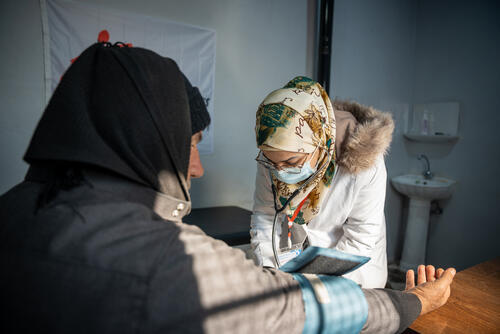
“We had to leave our homes because of the war and come to northwest Syria. Since we’ve been here, it’s been very hard to get medical care because hospitals that were working have now stopped,” says Salim Mohammed, who is internally displaced in northwest Syria. “I am 68 years old and a diabetic; hospital closures will be a death sentence to people like me.”
In the past few months, 77 health facilities in northwest Syria have been forced to suspend activities due to a lack of funding, including 17 hospitals, nine of which are women and children’s hospitals.
“We have received requests to directly support at least six hospitals and five basic healthcare centres, among which three of them are critical in the medical landscape of northwest Syria,” says Karim El-Rawy, MSF field coordinator for Idlib. “While we rely on our own funds, many other NGOs are sustained by public funding and their work is jeopardised by the cuts.”
In order to improve access to healthcare facilities for people in northwest Syria, it is essential to secure adequate funding. This will enable the rehabilitation of health structures damaged by earthquakes and ensure the provision of resources for the facilities to become operational and offer, at the very least, the same level of services that were available before the earthquake. The disparity between rising needs and shrinking funds is both contradictory and unacceptable.
In northwest Syria, MSF focuses on delivering critical medical and humanitarian assistance to the communities in Idlib and Aleppo governorates. Our teams co-manage or support six hospitals In addition, we run a burns facility, where our multidisciplinary approach comprises surgery, mental health services, physiotherapy and palliative care.
MSF also runs or supports 12 general healthcare centres, with a particular emphasis on sexual and reproductive health and community health promotion, and deploys 11 mobile clinics across the region, delivering essential medical services to displaced people in remote and inaccessible areas. Our other outreach activities include managing two clinics for non-communicable diseases, facilitating patient referrals through ambulances and delivering crucial water, sanitation and hygiene services in more than 100 camps.



